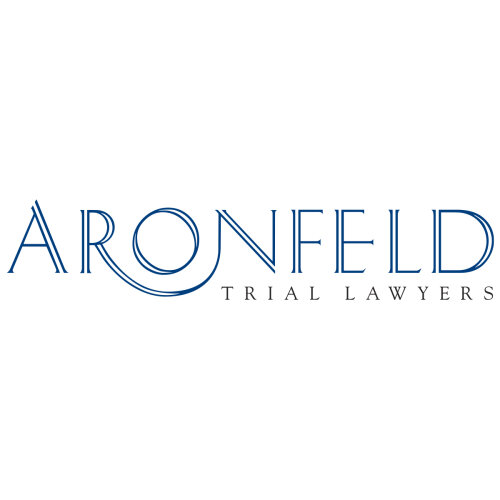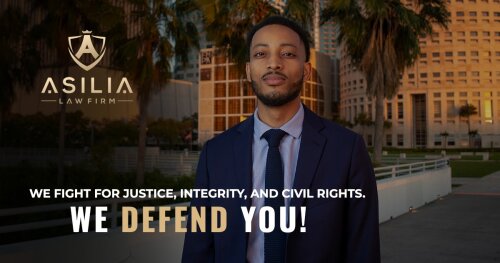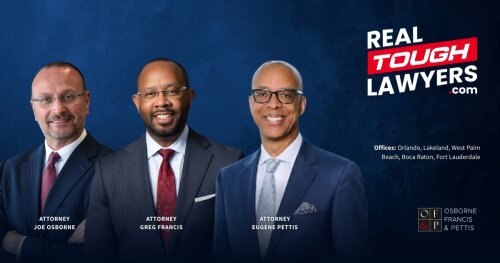Best Faith-Based Law Lawyers in Florida
Share your needs with us, get contacted by law firms.
Free. Takes 2 min.
Or refine your search by selecting a city:
List of the best lawyers in Florida, United States
About Faith-Based Law in Florida, United States
Faith-Based Law refers to legal issues arising from or relating to religious practices, organizations, or beliefs. In Florida, this can involve matters affecting churches, mosques, synagogues, other houses of worship, religious schools, faith-based charities, and individuals whose religious beliefs intersect with state or federal law. While the United States maintains a separation of church and state, faith-based organizations often operate within a complex legal landscape that blends religious doctrine with civil regulatory requirements. Understanding how these systems interact is essential for protecting both religious freedoms and compliance with the law.
Why You May Need a Lawyer
There are several scenarios in which individuals or organizations may require legal help with faith-based law in Florida:
- Establishing or incorporating a new religious organization or nonprofit
- Drafting or amending church bylaws, constitutions, or articles of incorporation
- Handling property disputes related to houses of worship or religious land use
- Navigating employment laws for faith-based employers, including religious exemptions
- Ensuring compliance with tax regulations for religious entities
- Addressing allegations of religious discrimination or violation of religious rights
- Managing intellectual property rights for religious texts, music, or branding
- Guiding estate planning in accordance with religious beliefs
- Advising on zoning regulations for religious buildings and community centers
- Representing individuals or organizations in court when religious rights are challenged
Local Laws Overview
Faith-based law in Florida is governed by a mix of federal, state, and local laws. Some of the key aspects include:
- First Amendment Protections: Both the United States Constitution and Florida Constitution guarantee freedom of religion and protection against state interference with religious practice.
- Religious Land Use: The Religious Land Use and Institutionalized Persons Act (RLUIPA) offers safeguards for religious institutions with respect to zoning laws and land use regulations. Local zoning ordinances in Florida must not place undue burdens on religious exercise.
- Nonprofit Status: Most faith-based organizations in Florida seek federal tax-exempt status under Section 501(c)(3) of the Internal Revenue Code. State laws also provide exemptions from certain taxes and registration requirements.
- Employment Law: Federal and state laws allow for some religious exemptions in hiring, particularly for positions related to religious functions. However, employment practices must still adhere to broader anti-discrimination laws.
- School Choice and Prayer: Florida allows some faith-based involvement in education, such as private religious schools and school choice scholarships. However, strict rules apply regarding prayer and religious instruction in public schools.
- Charitable Solicitation: Faith-based organizations that solicit donations in Florida may need to register with the Department of Agriculture and Consumer Services unless exempt.
- Marriage and Family Law: Religious leaders who officiate marriages must comply with both religious doctrine and state requirements for lawful marriage ceremonies.
Frequently Asked Questions
What legal protections do religious organizations have in Florida?
Religious organizations in Florida are protected by both federal and state constitutions, which guarantee free exercise of religion. Additional federal statutes such as RLUIPA ensure protection against discriminatory zoning or land use decisions. These organizations are also eligible for tax exemptions and certain employment law exemptions.
Can a Florida church lose its tax-exempt status?
Yes. Religious organizations can lose their federal or state tax-exempt status if they engage in substantial political activities, fail to file required documents, or operate for private benefit rather than religious purposes. Regular compliance with state and federal requirements is necessary to maintain tax-exempt status.
Are faith-based organizations in Florida required to register with the state?
Most charitable or faith-based organizations must register with the Florida Department of Agriculture and Consumer Services before soliciting donations unless they fall under specific exemptions. Legal counsel can help determine applicable requirements.
Can religious employers in Florida require employees to adhere to religious beliefs?
In many cases, religious organizations may require certain employees to adhere to faith-based standards, especially if their roles are religious in nature. However, broader employee protections under civil rights laws still apply unless a legal exemption is present.
How does Florida law handle religious land use conflicts?
RLUIPA and Florida law protect religious institutions from land use regulations that unreasonably burden their exercise of religion. If a zoning or land use decision negatively impacts religious practice, legal remedies might be available.
What are the rules around prayer in Florida public schools?
Prayer in public schools is permitted only if it is student-led and not sponsored by the school. Organized or mandatory prayer by schools is prohibited under the First Amendment.
Are clergy required to report abuse in Florida?
Yes. Florida law makes clergy mandatory reporters of known or suspected child abuse, with very limited exceptions for information received during confession or certain privileged communications.
How can faith-based organizations in Florida protect their property?
Faith-based organizations should ensure clear ownership records, properly drafted bylaws, and compliance with local zoning and building codes. In case of disputes, legal counsel may be necessary to resolve issues tied to property use or ownership.
Can religious beliefs be considered in Florida family law matters?
Florida courts will consider a child’s best interests in custody or visitation cases. While parents' religious beliefs may be taken into account, courts will intervene if a child's health or welfare is at risk.
What steps should I take if I believe my religious rights have been violated?
Document the incident, gather evidence where possible, and consult a lawyer experienced in faith-based law. Legal remedies may include filing complaints with government agencies or seeking relief in court.
Additional Resources
Those seeking further assistance or guidance may contact the following organizations and agencies:
- Florida Department of State: Division of Corporations - for nonprofit incorporation
- Florida Department of Agriculture and Consumer Services - for charitable solicitation registration
- U.S. Department of Justice: Civil Rights Division - for complaints on religious discrimination
- Internal Revenue Service - for nonprofit and 501(c)(3) tax status
- Local Bar Associations or Legal Aid Societies - for attorney referrals or pro bono legal help
- Religious Liberty legal advocacy groups active in Florida
Next Steps
If you believe you need legal assistance in a faith-based law matter in Florida, consider the following steps:
- Assess your specific needs, whether they relate to organizational governance, employment, property, or individual rights
- Gather all relevant documents, contracts, correspondence, or evidence related to your issue
- Contact a Florida attorney who specializes in nonprofit, religious, or faith-based law
- Consult with your religious organization's leadership for internal guidance, if appropriate
- Reach out to reputable organizations or government agencies for additional information or support
- Stay informed about your rights and obligations under both Florida and federal law
Legal issues involving faith-based law can be complex and sensitive. It is highly recommended to seek professional legal advice to help safeguard your organization, your rights, and your community.
Lawzana helps you find the best lawyers and law firms in Florida through a curated and pre-screened list of qualified legal professionals. Our platform offers rankings and detailed profiles of attorneys and law firms, allowing you to compare based on practice areas, including Faith-Based Law, experience, and client feedback.
Each profile includes a description of the firm's areas of practice, client reviews, team members and partners, year of establishment, spoken languages, office locations, contact information, social media presence, and any published articles or resources. Most firms on our platform speak English and are experienced in both local and international legal matters.
Get a quote from top-rated law firms in Florida, United States — quickly, securely, and without unnecessary hassle.
Disclaimer:
The information provided on this page is for general informational purposes only and does not constitute legal advice. While we strive to ensure the accuracy and relevance of the content, legal information may change over time, and interpretations of the law can vary. You should always consult with a qualified legal professional for advice specific to your situation.
We disclaim all liability for actions taken or not taken based on the content of this page. If you believe any information is incorrect or outdated, please contact us, and we will review and update it where appropriate.
Browse faith-based law law firms by city in Florida
Refine your search by selecting a city.











